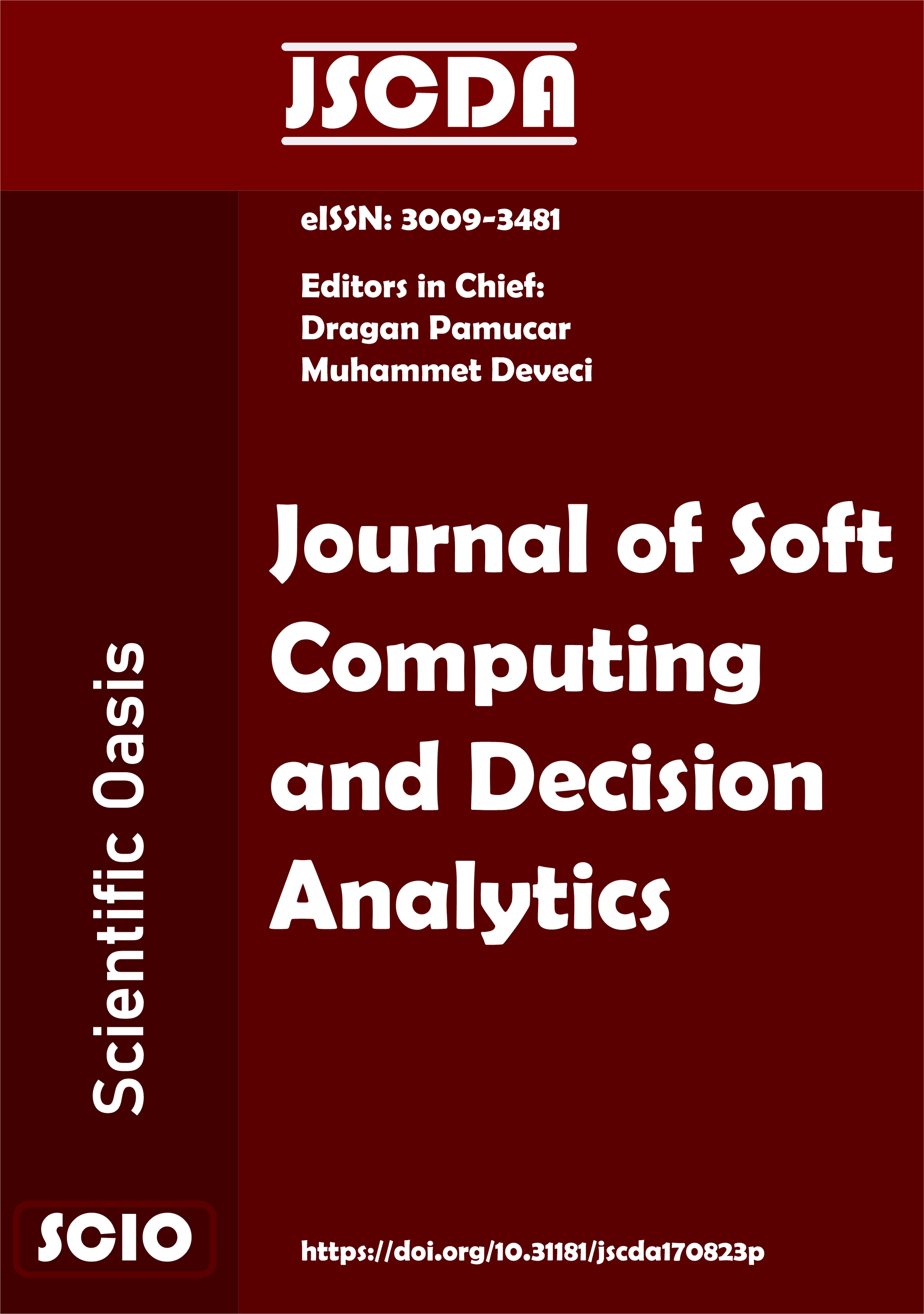Assessing Supplier Disruption Risks Using a Modified Pythagorean Fuzzy SWARA–TOPSIS Approach
DOI:
https://doi.org/10.31181/jscda21202440Keywords:
Supply Chain Management, Disruption Risk, Pythagorean Fuzzy Theory, TOPSIS, SWARAAbstract
As the complexity and uncertainty of global supply chains escalate, disruptions have become an increasingly common challenge in supply chain management. Suppliers, who serve as essential connectors for the seamless movement of goods and materials critical to production and distribution, are often at the center of these disruptions, highlighting their significant impact on the overall stability of the supply chain. This study proposes an innovative approach to assessing supplier disruption risks by combining the Pythagorean Fuzzy Step-wise Weight Assessment Ratio Analysis (PF-SWARA) with the Pythagorean Fuzzy Technique for Order Preference by Similarity to Ideal Solution (PF-TOPSIS). By reviewing the literature and consulting with supply chain experts, eight key risk factors were identified. The PF-SWARA method then quantifies the significance of these risks, while a modified PF-TOPSIS technique calculates each supplier’s risk score, facilitating the prioritization of suppliers for targeted improvement. The findings of the study indicate that “natural disasters and geopolitical risks,” “financial instability,” and “delivery delays” emerge as the top three critical disruption risk factors. Suppliers facing higher disruption risks should, therefore, formulate improvement strategies that target these three areas.
References
Xu, S., Zhang, X., Feng, L. and Yang, W. (2020). Disruption risks in supply chain management: a literature review based on bibliometric analysis. International Journal of Production Research, 58(11), 3508-3526. https://doi.org/10.1080/00207543.2020.1717011
Hosseini, S., Ivanov, D. and Dolgui, A. (2019). Review of quantitative methods for supply chain resilience analysis. Transportation research part E: logistics and transportation review, 125, 285-307. https://doi.org/10.1016/j.tre.2019.03.001
Verschuur, J., Koks, E. and Hall, J. (2020). Port disruptions due to natural disasters: Insights into port and logistics resilience. Transportation research part D: transport and environment, 85, 102393. https://doi.org/10.1016/j.trd.2020.102393
Tordecilla, R. D., Juan, A. A., Montoya-Torres, J. R., Quintero-Araujo, C. L. and Panadero, J. (2021). Simulation-optimization methods for designing and assessing resilient supply chain networks under uncertainty scenarios: A review. Simulation modelling practice and theory, 106, 102166. https://doi.org/10.1016/j.simpat.2020.102166
Baghersad, M. and Zobel, C. W. (2021). Assessing the extended impacts of supply chain disruptions on firms: An empirical study. International Journal of Production Economics, 231, 107862. https://doi.org/10.1016/j.ijpe.2020.107862
Aldrighetti, R., Battini, D., Ivanov, D. and Zennaro, I. (2021). Costs of resilience and disruptions in supply chain network design models: a review and future research directions. International Journal of Production Economics, 235, 108103. https://doi.org/10.1016/j.ijpe.2021.108103
Moosavi, J., Fathollahi-Fard, A. M. and Dulebenets, M. A. (2022). Supply chain disruption during the COVID-19 pandemic: Recognizing potential disruption management strategies. International Journal of Disaster Risk Reduction, 75, 102983. https://doi.org/10.1016/j.ijdrr.2022.102983
Sazvar, Z., Tafakkori, K., Oladzad, N. and Nayeri, S. (2021). A capacity planning approach for sustainable-resilient supply chain network design under uncertainty: A case study of vaccine supply chain. Computers & Industrial Engineering, 159, 107406. https://doi.org/10.1016/j.cie.2021.107406
Alikhani, R., Torabi, S. A. and Altay, N. (2021). Retail supply chain network design with concurrent resilience capabilities. International journal of production economics, 234, 108042. https://doi.org/10.1016/j.ijpe.2021.108042
Güneri, B. and Deveci, M. (2023). Evaluation of supplier selection in the defense industry using q-rung orthopair fuzzy set based EDAS approach. Expert Systems with Applications, 222, 119846. https://doi.org/10.1016/j.eswa.2023.119846
Lo, H.-W. (2023). A data-driven decision support system for sustainable supplier evaluation in the Industry 5.0 era: A case study for medical equipment manufacturing. Advanced Engineering Informatics, 56, 101998. https://doi.org/10.1016/j.aei.2023.101998
Lo, H.-W., Liaw, C.-F., Gul, M. and Lin, K.-Y. (2021). Sustainable supplier evaluation and transportation planning in multi-level supply chain networks using multi-attribute-and multi-objective decision making. Computers & Industrial Engineering, 162, 107756. https://doi.org/10.1016/j.cie.2021.107756
Durach, C. F., Wiengarten, F. and Choi, T. Y. (2020). Supplier–supplier coopetition and supply chain disruption: first-tier supplier resilience in the tetradic context. International Journal of Operations & Production Management, 40(7/8), 1041-1065. https://doi.org/10.1108/IJOPM-03-2019-0224
14. Katsaliaki, K., Galetsi, P. and Kumar, S. (2021). Supply chain disruptions and resilience: A major review and future research agenda. Annals of Operations Research, 1-38. https://doi.org/10.1007/s10479-020-03912-1
Kaur, H. and Singh, S. P. (2021). Multi-stage hybrid model for supplier selection and order allocation considering disruption risks and disruptive technologies. International Journal of Production Economics, 231, 107830. https://doi.org/10.1016/j.ijpe.2020.107830
Kamalahmadi, M., Shekarian, M. and Mellat Parast, M. (2022). The impact of flexibility and redundancy on improving supply chain resilience to disruptions. International Journal of Production Research, 60(6), 1992-2020. https://doi.org/10.1080/00207543.2021.1883759
Chen, K. and Xiao, T. (2015). Outsourcing strategy and production disruption of supply chain with demand and capacity allocation uncertainties. International Journal of Production Economics, 170, 243-257. https://doi.org/10.1016/j.ijpe.2015.09.028
Gualandris, J. and Kalchschmidt, M. (2015). Mitigating the effect of risk conditions on supply disruptions: the role of manufacturing postponement enablers. Production planning & control, 26(8), 637-653. https://doi.org/10.1080/09537287.2014.955895
Lücker, F., Chopra, S. and Seifert, R. W. (2021). Mitigating product shortage due to disruptions in multi‐stage supply chains. Production and Operations Management, 30(4), 941-964. https://doi.org/10.1111/poms.13286
Blackhurst*, J., Craighead, C. W., Elkins, D. and Handfield, R. B. (2005). An empirically derived agenda of critical research issues for managing supply-chain disruptions. International journal of production research, 43(19), 4067-4081. https://doi.org/10.1080/00207540500151549
Tomlin, B. and Wang, Y. (2011). Operational strategies for managing supply chain disruption risk. The handbook of integrated risk management in global supply chains, 79-101. https://doi.org/10.1002/9781118115800.ch4
Berger, N., Schulze-Schwering, S., Long, E. and Spinler, S. (2023). Risk management of supply chain disruptions: An epidemic modeling approach. European Journal of Operational Research, 304(3), 1036-1051. https://doi.org/10.1016/j.ejor.2022.05.018
Gupta, V., Ivanov, D. and Choi, T.-M. (2021). Competitive pricing of substitute products under supply disruption. Omega, 101, 102279. https://doi.org/10.1016/j.omega.2020.102279
Feng, X., Rong, Y., Shen, Z. J. M. and Snyder, L. V. (2022). Pricing during disruptions: Order variability versus profit. Decision Sciences, 53(4), 646-680. https://doi.org/10.1111/deci.12494
Fattahi, M., Govindan, K. and Keyvanshokooh, E. (2017). Responsive and resilient supply chain network design under operational and disruption risks with delivery lead-time sensitive customers. Transportation research part E: logistics and transportation review, 101, 176-200. https://doi.org/10.1016/j.tre.2017.02.004
Paul, S. K., Asian, S., Goh, M. and Torabi, S. A. (2019). Managing sudden transportation disruptions in supply chains under delivery delay and quantity loss. Annals of Operations Research, 273, 783-814. https://doi.org/10.1007/s10479-017-2684-z
Saputro, T. E., Figueira, G. and Almada-Lobo, B. (2021). Integrating supplier selection with inventory management under supply disruptions. International Journal of Production Research, 59(11), 3304-3322. https://doi.org/10.1080/00207543.2020.1866223
Kleindorfer, P. R. and Saad, G. H. (2005). Managing disruption risks in supply chains. Production and operations management, 14(1), 53-68. https://doi.org/10.1111/j.1937-5956.2005.tb00009.x
Kumar, B. and Sharma, A. (2021). Managing the supply chain during disruptions: Developing a framework for decision-making. Industrial Marketing Management, 97, 159-172. https://doi.org/10.1016/j.indmarman.2021.07.007
Ramanathan, U., Aluko, O. and Ramanathan, R. (2022). Supply chain resilience and business responses to disruptions of the COVID-19 pandemic. Benchmarking: An International Journal, 29(7), 2275-2290. https://doi.org/10.1108/BIJ-01-2021-0023
Stecke, K. E. and Kumar, S. (2009). Sources of supply chain disruptions, factors that breed vulnerability, and mitigating strategies. Journal of Marketing Channels, 16(3), 193-226. https://doi.org/10.1080/10466690902932551
Ma, C.-m. (2022). Impacts of demand disruption and government subsidy on closed-loop supply chain management: A model based approach. Environmental Technology & Innovation, 27, 102425. https://doi.org/10.1016/j.eti.2022.102425
Azadegan, A. and Dooley, K. (2021). A typology of supply network resilience strategies: complex collaborations in a complex world. Journal of Supply Chain Management, 57(1), 17-26. https://doi.org/10.1111/jscm.12256
Park, Y., Hong, P. and Roh, J. J. (2013). Supply chain lessons from the catastrophic natural disaster in Japan. Business horizons, 56(1), 75-85. https://doi.org/10.1016/j.bushor.2012.09.008
Gemechu, E. D., Helbig, C., Sonnemann, G., Thorenz, A. and Tuma, A. (2016). Import‐based indicator for the geopolitical supply risk of raw materials in life cycle sustainability assessments. Journal of Industrial Ecology, 20(1), 154-165. https://doi.org/10.1111/jiec.12279
Bednarski, L., Roscoe, S., Blome, C. and Schleper, M. C. (2023). Geopolitical disruptions in global supply chains: a state-of-the-art literature review. Production Planning & Control, 1-27. https://doi.org/10.1080/09537287.2023.2286283
Yang, J.-J., Lo, H.-W., Chao, C.-S., Shen, C.-C. and Yang, C.-C. (2020). Establishing a sustainable sports tourism evaluation framework with a hybrid multi-criteria decision-making model to explore potential sports tourism attractions in Taiwan. Sustainability, 12(4), 1673. https://doi.org/10.3390/su12041673
Gul, M. and Yucesan, M. (2022). Performance evaluation of Turkish Universities by an integrated Bayesian BWM-TOPSIS model. Socio-Economic Planning Sciences, 80, 101173. https://doi.org/10.1016/j.seps.2021.101173
Lin, S.-W. and Lo, H.-W. (2023). An FMEA model for risk assessment of university sustainability: using a combined ITARA with TOPSIS-AL approach based neutrosophic sets. Annals of Operations Research, 1-27. https://doi.org/10.1007/s10479-023-05250-4
Deveci, M., Gokasar, I., Pamucar, D., Zaidan, A. A., Wei, W. and Pedrycz, W. (2024). Advantage prioritization of digital carbon footprint awareness in optimized urban mobility using fuzzy Aczel Alsina based decision making. Applied Soft Computing, 151, 111136. https://doi.org/10.1016/j.asoc.2023.111136
Keršuliene, V., Zavadskas, E. K. and Turskis, Z. (2010). Selection of rational dispute resolution method by applying new step‐wise weight assessment ratio analysis (SWARA). Journal of business economics and management, 11(2), 243-258. https://doi.org/10.3846/jbem.2010.12
Stanujkic, D., Karabasevic, D. and Zavadskas, E. K. (2015). A framework for the selection of a packaging design based on the SWARA method. Engineering Economics, 26(2), 181-187. https://doi.org/10.5755/j01.ee.26.2.8820
Moslem, S., Stević, Ž., Tanackov, I. and Pilla, F. (2023). Sustainable development solutions of public transportation: An integrated IMF SWARA and Fuzzy Bonferroni operator. Sustainable cities and society, 93, 104530. https://doi.org/10.1016/j.scs.2023.104530
Deveci, M., Varouchakis, E. A., Brito-Parada, P. R., Mishra, A. R., Rani, P., Bolgkoranou, M. and Galetakis, M. (2023). Evaluation of risks impeding sustainable mining using Fermatean fuzzy score function based SWARA method. Applied Soft Computing, 139, 110220. https://doi.org/10.1016/j.asoc.2023.110220
Jafarzadeh Ghoushchi, S., Shaffiee Haghshenas, S., Memarpour Ghiaci, A., Guido, G. and Vitale, A. (2023). Road safety assessment and risks prioritization using an integrated SWARA and MARCOS approach under spherical fuzzy environment. Neural computing and applications, 35(6), 4549-4567. https://doi.org/10.1007/s00521-022-07929-4
Bouraima, M. B., Ibrahim, B., Qiu, Y., Kridish, M. and Dantonka, M. (2024). Integrated spherical decision-making model for managing climate change risks in Africa. Journal of Soft Computing and Decision Analytics, 2(1), 71-85. https://doi.org/10.31181/jscda21202435
Saeidi, P., Mardani, A., Mishra, A. R., Cajas, V. E. C. and Carvajal, M. G. (2022). Evaluate sustainable human resource management in the manufacturing companies using an extended Pythagorean fuzzy SWARA-TOPSIS method. Journal of Cleaner Production, 370, 133380. https://doi.org/10.1016/j.jclepro.2022.133380
Chakraborty, S. (2022). TOPSIS and Modified TOPSIS: A comparative analysis. Decision Analytics Journal, 2, 100021. https://doi.org/10.1016/j.dajour.2021.100021
Wątróbski, J., Bączkiewicz, A., Ziemba, E. and Sałabun, W. (2022). Sustainable cities and communities assessment using the DARIA-TOPSIS method. Sustainable Cities and Society, 83, 103926. https://doi.org/10.1016/j.scs.2022.103926
Yang, S., Pan, Y. and Zeng, S. (2022). Decision making framework based Fermatean fuzzy integrated weighted distance and TOPSIS for green low-carbon port evaluation. Engineering Applications of Artificial Intelligence, 114, 105048. https://doi.org/10.1016/j.engappai.2022.105048
Nazim, M., Mohammad, C. W. and Sadiq, M. (2022). A comparison between fuzzy AHP and fuzzy TOPSIS methods to software requirements selection. Alexandria Engineering Journal, 61(12), 10851-10870. https://doi.org/10.1016/j.aej.2022.04.005
Kuo, T. (2017). A modified TOPSIS with a different ranking index. European journal of operational research, 260(1), 152-160. https://doi.org/10.1016/j.ejor.2016.11.052
Downloads
Published
Data Availability Statement
Issue
Section
License
Copyright (c) 2024 Scientific Oasis

This work is licensed under a Creative Commons Attribution-NonCommercial-NoDerivatives 4.0 International License.
















